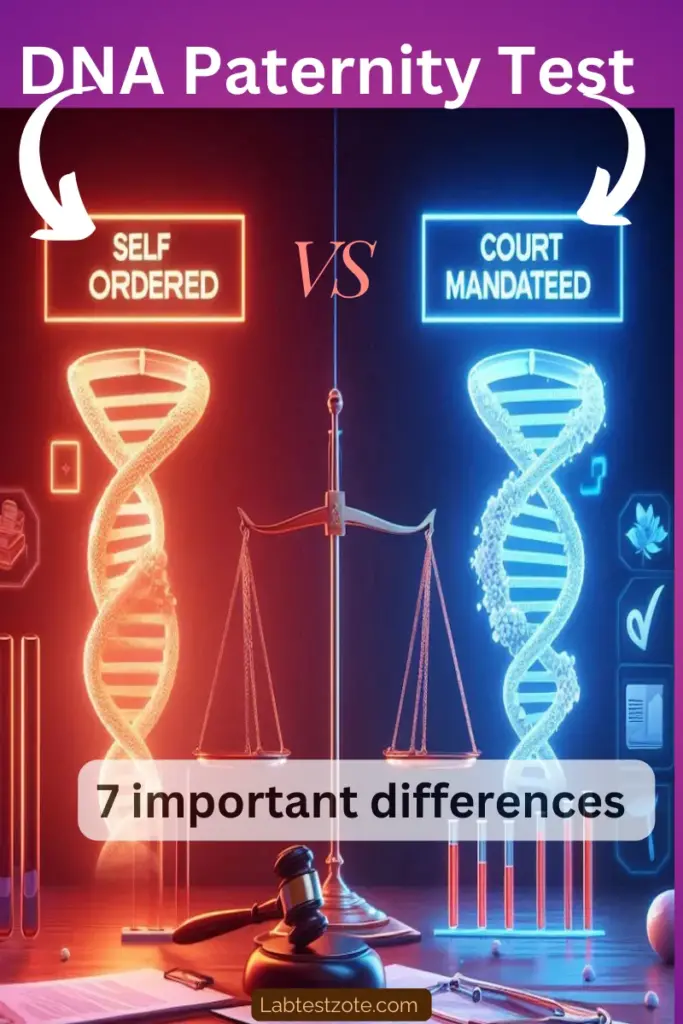There are 2 scenarios when it comes to DNA testing- either it’s for personal information or it’s a court ordered DNA paternity test. The technical aspects of the DNA analysis are the same, regardless of the reason for the test. However, there are some differences in the procedure, depending on whether you just want to know your family tree or for medical-legal reasons.
Before we delve into the details, read about our introduction to paternity testing, reasons why paternity testing is done and the most commonly asked questions on DNA testing.
Right, armed with that information, let’s examine the differences between the two DNA paternity testing scenarios
Table of Contents
- 1. Identity of Persons to be Tested
- 2. Chain of Custody
- 3. Sample Collection Settings
- 4. Paperwork
- 5. Purpose and Use of Results
- 6. Timing of Results
- 7. Cost of Paternity Tests
- Summary of the key differences: Self Vs Court Ordered DNA Paternity Test
- Related Articles
- Key Qualities Of A Great DNA Testing Service Provider (Why Labtestzote DNA Testing Is A Great Choice!!).
- Home DNA Test Sample Collection – Easy Step-by-Step Process
- Self Vs Court Ordered DNA Paternity Test – 7 Key Differences To Be Aware Of
- Vital Role Of Maternity Testing and Sibling Testing In Kenya For Biological Kinship Assessment
- DNA Paternity Testing in Kenya: Everything you need to know (Updated 2024)
- DNA Paternity Testing Questions: Your Top 17 Queries Answered
- Additional Resources
- Sharing is Caring
- Author

1. Identity of Persons to be Tested
For the court-initiated process, the persons to be tested (father, child, mother) are positively identified and documented. However, for DNA testing for informational purposes, It’s assumed the persons who present themselves are the real persons to be tested. In some cases, we send out the sample collection kits for home self-collection. Therefore, the identity of the tested parties is limited to the information provided in the consent form and is not verified independently.
2. Chain of Custody
A court ordered DNA paternity test requires a strict chain of custody protocol to be followed throughout the DNA testing process. The whole process from collection of samples, transportation, accessioning, storage, processing analysis and reporting must be immune from outside interference. This ensures the integrity of the samples and makes the results admissible in court.
The samples must be collected by an approved third party, such as a medical professional or laboratory scientist, who will document the process. The whole process and its integrity may be subjected to scrutiny in court and must be demonstrated to be beyond manipulation, intentional or otherwise.
In contrast, a self-ordered paternity test allows the samples to be collected by the parties involved, without an independent witness. While this is more convenient, the results from a self-ordered test cannot be used for legal purposes as the chain of custody is not preserved. In our consent form, we make it crystal clear the inadmissibility of results in the judicial process.
3. Sample Collection Settings
If you want a DNA Test for your information, you can come to the facility or have the test kit sent to you. It means the whole process can be done discreetly, conveniently and with utmost confidentiality.
For the legal process, It’s up to the judge to direct where, when and who will conduct the testing process. This is usually done at a public facility and all the parties to be tested must be present in person.
4. Paperwork
Paternity testing for personal reasons is as easy as getting any other laboratory test. You only need to fill out a consent form, and a copy of your national ID or passport and that’s it.
The process for court-ordered DNA paternity tests is much more arduous. Depending on the exact legal situation at hand, you will be required to fill out a number of forms as well as present your identification and other documentation as re
5. Purpose and Use of Results
Court-mandated paternity tests are ordered for specific legal purposes, such as establishing paternity for child support, custody, or inheritance rights. The results from these tests can be presented as evidence in court.
Self-ordered paternity tests, on the other hand, are typically done for personal reasons, such as confirming a suspected biological relationship or obtaining medical history information. The results cannot be used in legal proceedings.
6. Timing of Results
Court-mandated paternity tests can take 4-6 weeks for the results to be reported back to the court and parties involved.
Self-ordered paternity tests are generally faster, with results available within 10-14 working days after the lab receives the samples.
7. Cost of Paternity Tests
The Court-mandated paternity tests in Kenya vary from case to case. Sometimes, the court orders the cost to be shared equally by the litigants or the party that brought the case to court. In rare cases, the state may foot the bill. It’s important to note all court-initiated DNA paternity tests in Kenya are conducted primarily in public institutions such as KEMRI or Government Chemis
Summary of the key differences: Self Vs Court Ordered DNA Paternity Test
| # | Characteristic | Court-Mandated Paternity Test | Self-Ordered Paternity Test |
|---|---|---|---|
| 1 | Identity of Tested Persons | Verified Identities | Not independently identified |
| 2 | Chain of Custody | Strict protocol followed by approved third-party | Samples collected by parties involved |
| 3 | Purpose | Legal purposes (child support, custody, inheritance) | Personal reasons (confirmation, medical history) |
| 4 | Documentation | More detailed | Minimal – Only requires Consent and identification document |
| 5 | Use of Results | Evidence in a Court/ Judicial Process | Not admissible as evidence |
| 6 | Timing of Results | 4-6 weeks | 10-14 business days |
| 7 | Cost | Shared by litigants or determined by the court | Paid by individuals |
In conclusion, the main difference between self-ordered and court-mandated DNA paternity tests is the legal admissibility of the results. Court-mandated tests follow a strict protocol to ensure the integrity of the samples, making the results usable as evidence, while self-ordered tests lack this chain of custody and cannot be used for legal purposes.
Which is the right DNA Test for you?
From the discussion above, your choice will be dictated by your circumstances. If you are already in a judicial process, then you need to abide by the conditions stipulated. For personal knowledge, it’s relatively straightforward.
For further advice, be sure to click the WhatsApp button below or write to us directly
Related Articles
Key Qualities Of A Great DNA Testing Service Provider (Why Labtestzote DNA Testing Is A Great Choice!!).
DNA testing is a once-in-a-lifetime undertaking. There’s a lot at stake, and there can be…
Home DNA Test Sample Collection – Easy Step-by-Step Process
Overview of DNA Testing reasons for dna testing Common DNA test questions DNA test results…
Self Vs Court Ordered DNA Paternity Test – 7 Key Differences To Be Aware Of
There are 2 scenarios when it comes to DNA testing- either it’s for personal information…
Vital Role Of Maternity Testing and Sibling Testing In Kenya For Biological Kinship Assessment
Introduction To Maternity Testing And Sibling Testing Maternity testing and sibling testing are two types of…
DNA Paternity Testing in Kenya: Everything you need to know (Updated 2024)
Introduction to DNA Paternity Testing reasons for dna testing common dna test questions home dna…
DNA Paternity Testing Questions: Your Top 17 Queries Answered
reasons for DNA testing Overview of dna testing home dna sample collection DNA test results…
Additional Resources
Disclaimer
The information provided on this medical blog is for general informational purposes only and should not be considered as a substitute for professional medical advice. Always consult with a qualified healthcare provider before making any healthcare decisions or taking any actions based on the information provided on this blog. The authors and publishers of this blog are not liable for any errors or omissions in the content or for any actions taken based on the information provided.
[1] https://dnacenter.com/blog/what-you-need-to-know-about-a-court-ordered-paternity-test/
[2] https://www.mdsafrica.net/paternity-dna-relationship-tests/legal-vs-peace-of-mind-dna-paternity-relationship-tests/
[3] https://www.easydna.co.za/home-vs-court-admissible-legal-testing/
[4] https://kenyalaw.org/caselaw/cases/view/125750/
[5] https://www.testing.com/tests/paternity-test/




